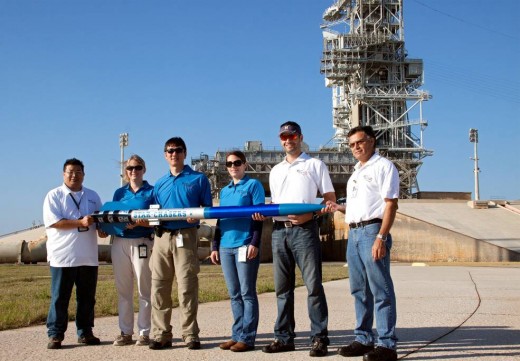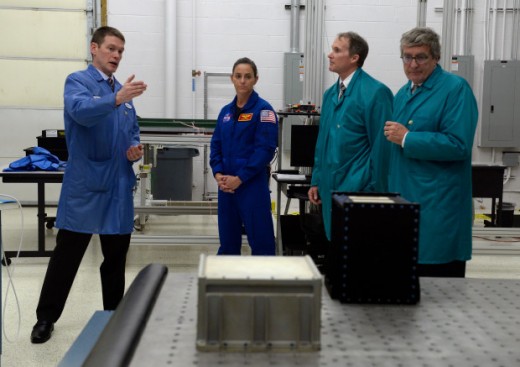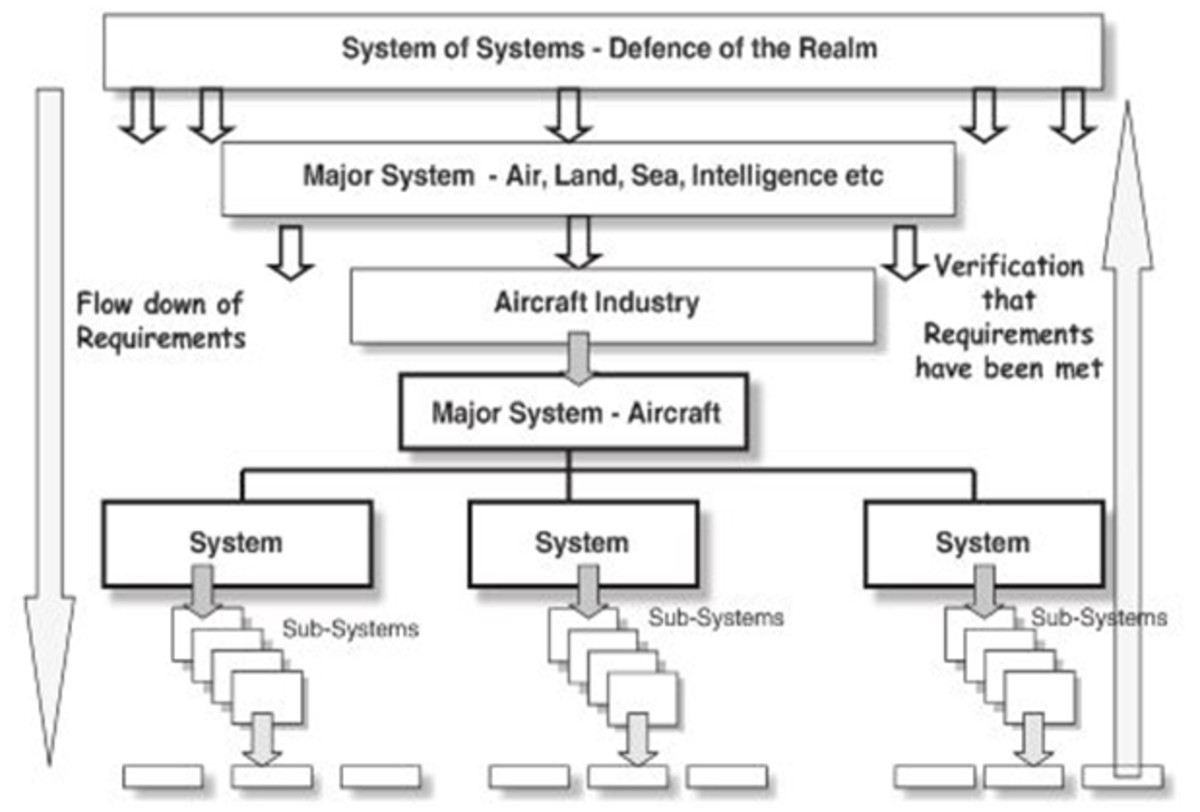Engineering Jobs in Aerospace
The aerospace industry hires engineers from many different disciplines. Not just Aerospace Engineers find their career paths leading to an aerospace contractor. Anything that flies in space needs a multi-disciplinary team to get it there safely.
Aerospace companies will hire people from these disciplines:
- Electrical Engineering
- Aerospace Engineering
- Mechanical Engineering
- Software Engineering
Read about more engineering degrees and their possible career paths.

Mechanical Engineers at an Aerospace Company
The aerospace industry always needs to hire Mechanical Engineers. Hiring managers at aerospace companies understand that mechanical engineering is a versatile degree. They are able to take on roles from mission and avionics design to testing and manufacturing space-rated systems. Additional specialties can be learned on the job or by returning to college to get a Master's.
Structural Engineers
All vehicles sent into space, whether they are landers or satellites or crew capsules, need to withstand high amounts of stress and loads during launch. This requires mechanical engineers to design and fabricate the vehicle.
Most structural engineers started with a mechanical or civil background. These employees become experts on analyzing loads on a vehicle. They spend a lot of time with CAD models ensuring that the design can withstand the harsh environment it will experience when riding on the launch vehicle or during dynamic events.
Other Types of Analysis
Thermal analysis is usually performed by mechanical engineers who have additional training in heat transfer. The harsh environments of space (both hot and cold) make this a particular challenge for the aerospace industry.
Mechanical or Structural Testing
Space vehicles that are designed and flown for the first time have to be mechanically tested before they are launched into orbit (or beyond). To determine whether the design is robust enough mechanical engineers design a test that puts it under loads and strain that mimic the real environments felt during launch.
Electrical Engineering in Aerospace Industry
There are many electrical engineering applications in aerospace. Almost every aspect of a space mission is driven by power and electronics.
Engineers who studied electrical during college have a huge list of jobs they can contribute to on an aerospace project.
Power System Engineers
It takes electrical engineers with a good understanding of power generation to size and analyze the power system. They will perform trade studies on components like the batteries and solar arrays to evaluate the best choice for the architecture. Engineers build in redundancy to the electrical power system.
Designing Avionics
Branching off from the main power system there are many smaller systems that need avionics to control the life support system, propulsion, communication, etc. Electrical engineers play a key role in designing the controllers for these systems.
Flight Instrumentation and Sensors
The vehicle needs as much information as possible about the its speed, attitude, temperature, power output, etc to allow it to respond to dangerous situations. The system for instrumenting the vehicle is managed by electrical and mechanical engineers.
Avionics Testing
All of these systems and subsystems that are designed by electrical engineers also need EEs to test them. Many test engineers have an electrical background they use for functionally testing avionics. Other engineers perform EMI/EMC testing, which stands for Electromagnetic interference and electromagnetic compatibility, respectively.
Wiring (Harnessing)
Any spacecraft has a huge amount of wiring, also called harnessing. Mechanical engineers who are planning the wire routing in CAD need inputs from electrical engineers about the length and gauge of the harness. EEs are tasked with solving problems like temperature changes throughout a wire or understanding how a signal changes along the length.

Aerospace Engineering Degree
Obviously, students who study aerospace engineering learned skills that companies building spacecraft need. This degree is a more focused version of mechanical engineering where students learn more about flight dynamics and fluid mechanics.
Aerospace Engineering in Mission Architecture
When beginning the process of designing a new mission for a lander or satellite the path the vehicle will take and how much propellant it needs to get there needs to be calculated. It's the aerospace engineers with knowledge of orbital mechanics that do these calculations. The mission timeline and objectives are what set the requirements for the vehicle to be designed to.
Guidance, Navigation and Control (GNC)
GNC is a specialized subsystem that is necessary for any vehicle, and it becomes much more difficult and complicated when that vehicle leaves Earth. Aerospace engineers who have a working knowledge of programming are particularly suited to work on a GNC team. A software engineer or a mechanical engineer wouldn't be a bad choice either, they just have more to learn than someone with an aerospace degree.
GNC work could involve modelling the vehicle's expected trajectory in MATLAB and calculating how much thrust it needs. Other tasks include performing testing to show the navigation system meets requirements or a designing a system to stabilize a satellite once in orbit.
Software Engineers on Aerospace Projects
More and more, modern spacecraft rely on sophisticated on-board software. Where possible, many vehicles are designed with automated systems. This allows the software on-board to control the flight without needing to communicate with the ground all the time.
Software also plays an important role in adding to the redundancy of a spacecraft. Software engineers and computer scientists who are dedicated to solving tough problems and willing to see the big picture are necessary for any aerospace program.
What do Software Engineers do in the Aerospace Industry?
A software engineer might be programming component-level firmware or ensuring that various components correctly interface with the whole system.
During the testing phase of a program many software engineers are going to work putting their code through rigorous tests.
For some missions there is even more software work to do once the vehicle is flying. Landers or orbiters that are sent out to other planets, for example, require constant monitoring and occasional recalculations along the way to correct course. A team with a software background is needed to manage the data from the spacecraft and give it instructions on where to go next.
Other Technical Disciplines
Though Aerospace, Mechanical, Electrical and Software Engineering make up the vast majority of hires in the aerospace industry there are still plenty of technical roles that require other backgrounds.
Chemical Engineering
Chemical engineering degrees aren't commonly found at an aerospace company but they do have a few applications. The propulsion system of an aircraft or spacecraft can be optimized by someone with a chemical engineering background.
Material Science or Chemistry
Special materials that are safe for spaceflight can require cutting edge material science and chemistry. Composites and metals that are strong and light can make a huge difference to the robustness of a design. Scientists and engineers with these backgrounds can develop new materials or help design processes to manufacture them to high standards.
Information Technology
IT or system administration is important on any large project. This is especially true in the aerospace industry where security is so important.
This content is accurate and true to the best of the author’s knowledge and is not meant to substitute for formal and individualized advice from a qualified professional.
© 2018 Katy Medium








